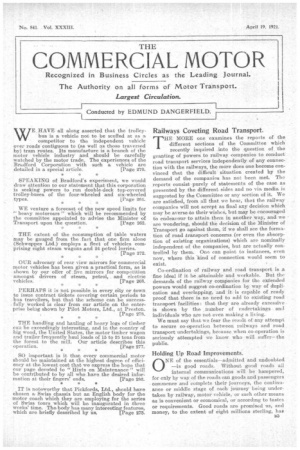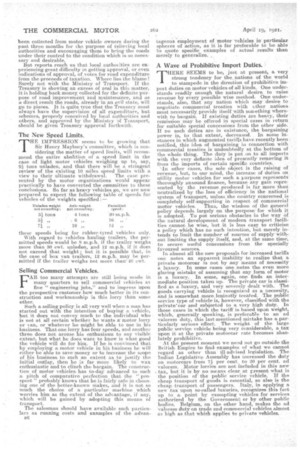Railways Coveting Road Transport.
Page 1

Page 2

If you've noticed an error in this article please click here to report it so we can fix it.
THE MORE one examines the reports of the different sections of the Committee which recently inquired into the question of the granting of powers to railway companies to conduct road transport services independently of any connection with the railways, the more does one become convinced that the difficult situation created by the demand of the companies has not been met. The reports consist -purely of statements of the case. as presented by the different sides and no via media is suggested by the Committee or any section of-it. We are satisfied, from all that we hear, that the railway companies will not accept as final any decision which may be averse to their wishes, but may be. encouraged to -endeavour to attain them in another way, and we • are wondering, should the decision of the Minister of Transport go against, them, if we shall see the formation of road transport concerns (or even the absorption of existing organizations) which are nominally independent of the companies, but are actually controlled by them. One can. point to instances, even now, where this 'kind of connection would seem to exist.
Co-ordination of railway and road transport is a • fine ideal if it be attainable and workable. But the demands of the railway companies for the extended powers would suggesi3 ea-ordination by way of duplication and overlapping, and it is capable of ready proof that there is no need to acid to existing road transportfacilities: that they are already excessive. is shown . by the . number of undertakings . and individuals who are not. even making a living.
We must say that we fear the result. of any attempt to secure co-operation between railways and road transport undertakings, bemuse when co-operation is seriously attempted we know who will suffer—the public. .
Holding Up Road Improvements.
NE of the essentials—admitted and undoubted —is good roads. Without good roads all internal communications will be hampered, for only by way of the roads can goods and passengers commence and complete their journeys, the continuance or middle stage of each journey being undertaken by railway, motor vehicle, or such other means -as is convenient or economical, or according to tastes or requirements. Good roads are promised us, and money, to the extent of eight millions sterling, has been collected from motor vehicle owners during the past three months for the purpose of relieving local authorities and encouraging them to bring the roads under their control to the condition which is so necessary and desirable.
But reports reach us that local autholities are experiencing great difficulty in getting approval, or even indications of approval, of votes for road expenditure from the proceeds of taxation. Where lies the blame? Surely not with the Ministry of Transport.. If the Treasury is showing an excess of zeal in this matter, it is holding back money, collected for the definite purpose of road improvement and maintenance, and as a direct result the roads, already in an evil state, will go to pieces. It is quite true that the Treasury must always have the supervision of all expenditure, but schemes, properly conceived by local authorities and others, and approved by the Ministry 'ef Transport, should be given Treasury approval forthwith.
The New Speed Limits.
THE IMPRESSION seems to be growing that Sir Henry Maybury's committee, which is considering the matter of speed limits, will recommend the entire abolition of a speed limit in the case of light motor vehicles. weighing up to, say, 24 tons unladen, and that there will be a stringent review of the existing 10 miles speed limits with a view to their ultimate withdrawal. The ease presented by the motor organizations would appear practically to have converted the committee to these conclusions. So far as heavy vehicles go, we are now prepared to expect the following table of speeds for vehicles of the weights specified :—
these speeds being for rubber-tyred vehicles only. With regard to vehicles hauling trailers, the permitted speeds would be 8 m.p.k if the trailer weighs more than 30 cwt. unladen, and 12 m.p.h. if it does. not exceed that weight ; but it is possible that, in the case of box van trailers, 12 m.p.h. may be permitted if the trailer weighs not more than' 40 cwt.
Selling Commercial Vehicles.
F .
AR too many attempts are still being made el many quarters to sell commercial vehicles as fine "engineering. jobs," and to impress Upon the prospective customer how much better in its construction and workmanship is this lorry than some other.
Such a selling policy is all very well when a man has started out with the intention of buying a vehicle, but it does net convey much to the individual who is not at all certain whether he wants amotor lorry or van, or whatever he might be able. to use in his business. That one lorry has four speeds, and anothes three does not arouse his enthusiasm to any visible extent, but what he does. want. to know is what good the vehicle will do for him. If he is convinced that by employing a motor vehicle in his business he will either be able to sate money or to increase the scope of his business to such an extent as to justify the initial outlay, then he is far more likely to wax enthusiastic and to clinch the bargain. The construction of motor vehicles. has to-day advanced to such a. pitch of comparative perfection that the " prospect" probably knows that he is fairly safe in choosing one of the better-known makes, and it is not so much the choice of a particular machine which worries him as -the extent of the advantage, if any, which will be gained by adopting this means of transport.
The salesman should have available such particulars as running costs and examples of the advans6 tageous employment of motor vehicles in particular spheres of action, as it is far preferable to be able to quote specific examples of actual results than merely to generalize.
A Wave of Prohibitive Import Duties.
THERE SEEMS to be,' just at present, a very strong tendency for the nations of the world to stampede in the direction of prohibitive import duties on meter vehicles of all kinds. One understands readily enough the natural desire to -raise revenue by every possible. wise method. One under' stands, also, that any nation which may desire to negotiate commercial treaties with ether nations must necessarily., provide itself with something wherewith to bargain. If existing duties are heavy, their remission may be offered in special cases in return for suitable special concessions from the other side. If no such duties are in existence the bargaining power is, to that extent, decreased. In some instances in which augmented tarifts have recently been notified, this idea of bargaining in connection with commercial treaties is undoubtedly at the bottom of the whole thing. The duty is put on to all imports with the very definite idea of presently removing it from the imports of certain specific countries. "in other cases, the sole: object is the raising of reeenue, but, to our mind, the increase of duties on utility motor vehicles for such a purpose -represents thoroughly unsound finance, because any gam represented by the revenue produced is far more than neutralized by the loss of efficiency in the national system of transport, unless the country concerned is' completely self-supporting in respect of commercial motor vehicles. Thus, the wisdom of the general policy depends largely on the purpose for which it is adopted. To pat serious obstacles in the way Of . the natural .development of modern transport facilities cannot be wise, but it is lees easy to criticise a policy which has no. such intention, but merely intends to limit the number of sources of supply without limiting the supply itself, and, at the same time, to secure useful concessions from the specially
favoured sources. .
In almost all the. new proposals for increased tariffs one notes. an apparent inability to realize that a private motorcar is not. by any means of necessity a. luxury. In some. cases one notes the even more glaring mistake of assuming that any form, of motor is a luxury. In some, again, one finds, an intermediate position taken up. The private car is classified as a luxury, and very severely dealt with. The goods. carrying vehicle is recognized as a necessity, and is somewhat morelenieetly treated. The public service type of vehicle is, however, classified with the private' car and. subjected to a. very high duty. In those cases in which the tariff is, based upon weight, which, generally speaking, is preferable to an ad valorem duty, this last-mentioned mistake has a particularly serious effect. The weight of the large public seevice vehicle being very considerable, a tax upon it at the private motorcar rate becomes absolutely prohibitive..-At the present moment we need not go outside te British Empire to find examples of what we cannot regard . as other than illadvisetl legislation. The Indian Legislative Assembly has increased the duty on motorcarsfrom ii per cent. to 20 per cent. ad valorem. Motor lorries are. not included in this new tax, but it is by no means clear at present what is the position of the publicservice vehicle. If the cheap transport of goods is essential, so also is the cheap transport of passengers. Italy, in applying a new tax upon so-called luxuries, recognizes this fact up to a, point by exempting vehicles for services authorized by the Government; or by other public bodies. Belgium, on the other hand, makes the ad valorem duty on trade and commercial vehicles almost as high as that which applies to private vehicles.




























